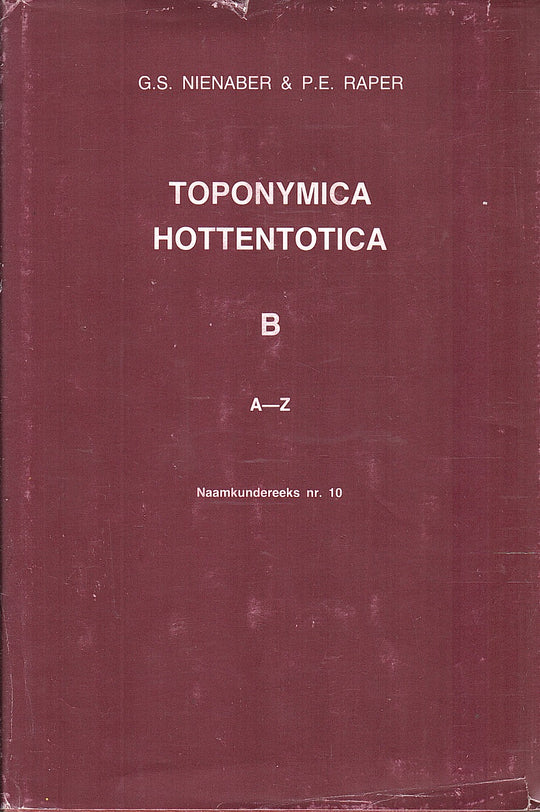eng
Little-Nour River runs right from the Mission Station Leliefontein past North Worts in the Great Nour River that becomes a tributary of the Buffalo River, a river in the Atlantic Ocean. The name does not occur at Gordon, nor at other earlier travelers. The spelling 'now' is the distortion of the Dutch 'NAAU (W) -' as at the census card and at Veillet. If reference terms are 'now' meaningful and good. Especially if it is also appropriate. But now everything comes to a remarkable geographical and nomination fact. Just south of Leliefontein, near the Klein-Nour River, we get the 'Wilghou River', more southward the 'Wilgenhout River' (with a compounds), and east of Leliefontein and of the Klein- Nour River there are the places ' One Wilger 'and' Small-One Wildger '. In other words, as it seems out of the names, the willow trees fall next to the water spots Weidenbaum (Dec Orange) '(Kr. been made. This Salix Sp. is often stored in place names, cf. o.a. Kneu, noids (river), nuis and nuy. The palatal slap is so roughly formed at the same articulation point as the usual -n-, and bowler is the -u- of ╪hu (I) - drugs, so that this sounds for the unrecognized listener as (╪) nui. The naming fact that Gordon mentioned 1797, viz. that all the place names here and that the whites translate it, the geographical fact that the Nourivier (s) and the willow wood (s) are close to each other, and the linguistic fact that Khoekhoeni ╪hui - already in place in place occur than TVUI, maidenic etc Inland name meaning 'will- (R) river'. Everything taken together, we think this is the case, viz. That Nourivier is a whole nethimological 'mackerage' of the original name, D.W.S. That Nour River has nothing to do with the concept 'now', that it is also not Afrikaans. Putitated positively: Nourivier is too much as the old Khoekhoense name meaning 'Wilge (wood) river'.
afr
Klein-Nourivier loop regs van die sendingstasie leliefontein verby noord- waarts in die Groot-Nourivier wat n sytak word van die Buffelsrivier, 'n rivier wat in die Atlantiese Oseaan uitwater. Die naam kom nie by Gordon voor nie, ook nie by ander vroeëre reisigers nie. Die spelling 'Nou-' is die verafrikaansing van die Nederlandse 'Naau(w)-' soos by die Sensuskaart en by Veillet. As verwysingsterm is 'nou-' sinvol en goed. veral indien dit ook nog toepaslik is. Maar nou kom by alles nog n opmerklike geografiese en benoemingsfeit. Net suid van leliefontein, naby die Klein-Nourivier, kry ons die 'Wilgenhoutrivier', meer suidwaarts die 'Wilgenhoutsrivier' (met 'n verbindings -s-), en ten ooste van leliefontein en van die Klein- Nourivier is daar die plekke 'Een Wilger' en 'Klein-Eenwilger'. Met ander woorde: soos ook uit die name blyk, val die wilgerbome hier op langs die waterplekke. In Nama is die wilgerboom, by name die Salix ba- bylonica, die Thui- = 'der Weidenbaum (des Oranje)' (Kr.-R. 1969 NW 205), 'n baie belangrike boomsoort waaruit houtemmers, stampblokke, lepels ens. gemaak is. Hierdie Salix sp. is dikwels in plekname bewaar, vgl. o.a. KNEU, NOOIENS(RIVIER), NUIS en NUY. Die palatale klap word so ongeveer gevorm op dieselfde artikulasiepunt as die gewone -n-, en bowen- dien is die -u- van ╪hu(i)- genasaleer, sodat Thui vir die onbevange hoorder klink soos (╪)nui-. Die naamkundige feit wat Gordon 1797 genoem het, nl. dat al die plekname hier Namaname dra en dat die Blankes dit vertaal, die geografiese feit dat die Nourivier(e) en die Wilger- hout(s)riviere naby mekaar le, en die taalkundige feit dat die Khoekhoense ╪hui- reeds elders in plekname voorkom as TVui-, Nooiens- ens., en dat ╪hui- kan korreleer met die Afrikaanse Nou- van vandag, dit alles laat die vraag boeiend word in hoeverre dit waar is dat Nou-rivier net 'n volksetimologiese verafrikaansing is van die ou inlandse naam wat beteken 'Wil- ge(r)rivier'. Alles saam geneem, meen ons dat dit die geval is, nl. dat Nourivier 'n volksetimologiese 'makmaking' is van die oorspronklike naam, d.w.s. dat Nourivier eintlik niks met die begrip 'nou' te doen het nie, dat dit ook nie Afrikaans is nie. Positief gestel: Nourivier is te ver- staan as die ou Khoekhoense naam wat beteken 'Wilge(houts)rivier'.




